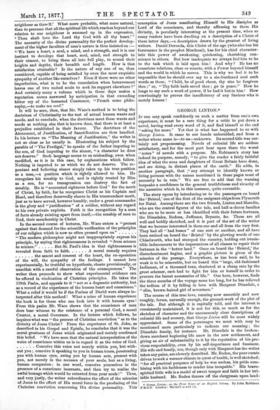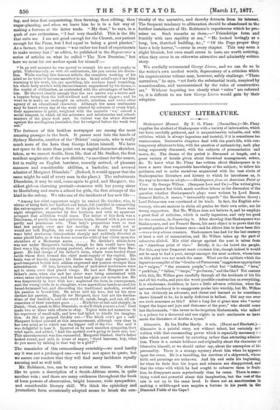GEORGE LINTON.*
IF one may speak confidently on such a matter from one's own experience, it must be a rare thing for a critic to put down a novel, having read every word of it, and find himself at the end "asking for more." Yet that is what has happened to us with George Linton. It came to our hands unheralded, and from a writer whose name is—to us—unknown. Its second title was cer- tainly not prepossessing. Novels of colonial life are seldom satisfactory, and for the most part bear upon them the worst " notes " of novels with a purpose. Mr. Robinson's story has indeed its purpose, namely, "to give the reader a fairly faithful idea of 'what the sons and daughters of Great Britain have done, and are doing, in distant places of the earth." He adds, in another paragraph, that ." any attempt to identify known or living persons with the names mentioned in these pages must of necessity be in vain." We are free to add that the warning bespeaks a confidence in the general truthfulness and vivacity of the narrative which is, in this instance, quite excusable.
The story opens by introducing us to the passengers on board the' Bristol,' one of the first of the emigrant-ships from Plymouth for Natal. Among these are the two friends, Linton and Marsdin, who are the central figures of the tale, and half-a-dozen families who are to be more or less identified with their future fortunes, the Dimsdales, Bodens, Joffinses, Bryants, &c. These are all well and boldly sketched, and it is part of the art of the writer that we become interested in them one and all from the very first. They had all "had losses" of one sort or another, and all have been enticed on board the 'Bristol' by the glowing words of one Chiselworth, who had stumped the country, holding out irresis- tible inducements to the impecunious of all classes to repair their fortunes in the "better land." Once on board the Bristol,' the disenchantment begins, and a graphic picture is given of the miseries of the passage. Everywhere, as has been said, to be weak is to be miserable, but on board this "large, old-fashioned Indiaman, of a thousand tons, chartered at a cheap rate by the great schemer, each had to fight for him or herself in order to procure the barest necessaries of life." Our hero, however, finds the three months of the voyage none too long, for he has relieved the tedium of it by falling in love with Margaret Dimsdale, a "slim, brown-haired girl of seventeen."
The course of this true love, running now smoothly and now roughly, forms, naturally enough, the ground-work of the plot of the tale. But although it is capitally told, and the interest is consistently maintained, it is not for this, so much as for the sketches of character and the uncommonly clear descriptions of colonial life and scenery, that George Linton will be most widely appreciated. Some of the personages we meet with may be mentioned more particularly to indicate our meaning ; the Dimsdale family, for instance. Mr. Dimsdale is the broken- down merchant beginning life anew in the new settlement, and giving an air of substantiality to it by the reputation of his pre- vious respectability, even by his self-importance and fussiness. His wife and family, too, though only with Margaret has the writer taken any pains, are cleverly described. Mr. Boden, the poor curate driven to seek a warmer climate in quest of health, is well sketched; "for all practical purposes of help he was useless, his pride com- bining with his feebleness to render him incapable." His brave- spirited little wife is a model of sweet temper and faith in her imi- table husband. Mr. Boden throws off the clergyman upon land-
* George Linton; or, The First Tears of an English Colony. By John Robinson F.R.G.S. London : Tdsomill ,n and Co. ing, and tries first carpentering, then farming, then editing, then sugar-planting, and when we leave him he is in a fair way of making a fortune at the latter trade. "My dear," he says, in a gush of rare enthusiasm, "I feel very thankful. This is the life that suits me. I am not good enough for the Church, nor patient enough for the Press, but I feel equal to being a good planter." As a farmer, the poor curate "was rather too fond of experiments to make money fast ;" as editor, he published in the Regenerator a series of articles on what he called "The New Doctrine," but here we must let our author speak for himself :— " In an evil moment he was moved to commit his new philosophy to print. Unfortunately, as with all enthusiasts, his pen outran his discre- tion. While reading this famous article, the complete working of his mind as he wrote it became manifest to me. In my mind's eye I saw him warming to his work, his eye sparkling, his nervous hand trembling, his whole body atwitch with the excitement engendered by his theme,— the vanity of civilisation, as contrasted with the advantages of barbar- ism. He showed clearly enough that the raw native was a better and a happier being than the half-civilised and converted nigger ; and he went on to make an onslaught on schools missions, and every other agency of an educational character. Although the same sentiments may be heard every day of the week uttered by colonists of every kind, their appearance in print, weighted with the majestio 'we,' caused a social tempest, in which all the ministers and missionaries and school- masters of the place took part. So violent was the abuse directed against the sacrilegious journalist, that he resigned before the week was out."
The fortunes of this luckless newspaper are among the most amusing passages in the book. It passes next into the hands of Sydney Marsdin, another of the ' Bristol' emigrants, who is really much more of the hero than George Linton himself. We have not space to do more than point out as capital character-sketches, taken, as we cannot doubt, from life, that of Mr. Stalker, the first resident magistrate of the new district, "a merchant for the nonce, but in reality an English barrister, recently arrived, of pleasant manners and considerable abilities, a bachelor, and avowed admirer of Margaret Dimsdale." (Indeed, it would appear that the same might be said of every man in the place.) The unfortunate Dimsdales, it may be said, come again to grief, and Margaret, the eldest girl—a charming portrait—removes with her young sister to Maritzburg and starts a school for girls, the first attempt of the kind in the colony. We take one of the incidents of her new life :— "Among her chief supporters might be ranked Mr. Groblor, who, in virtue of being both her landlord and baker, felt justified in committing the extravagance of sending three of his girls to schooL There were eight altogether, supported by five brothers, and with no apparent prospect that additions would cease. The father of this flock was a Dutchman, of portly form and ponderous brain, blessed with a yet more portly and ponderous wife. That lady's proportions were so vast that few people ever saw her moving. As she could not or would not talk English, the only sounds ever heard uttered by her were brief stertorous interjections sharply and suddenly directed at some placid babe' as it was borne across the orbit of her vision upon the shoulders of a Hottentot nurse Mr. Grobler's eldest-born was not under Margaret's tuition, though he fain would have been. Gert was a big, sheepish young pastoral, about a year older than Mar- garet. He had charge of his father's farm, where were herded those cattle whose flesh formed the chief meat-supply of the capital. His brain was of bucolic temper ; his limbs were large and vagrant ; his good-tempered boyish face seldom expressed any passion stronger than astonishment Of late, however, smiles of unwonted tenderness were apt to creep over that placid visage. He had met Margaret at his father's once, when she and her sister were being entertained with sweet oakes and conserves, and his heart had gone out towards her. He was desperately in love with her ; neglected the farm in consequence, sent the wrong cattle in to slaughter, wove marvellous bands around his broad-brimmed hat, and discarding the traditional moleskin, swathed his passion in broadcloth. He never told his love, but let his eyes declare his passion. Happily for Margaret, they had not the fascina- tions of the basilisk's, and she could sit, speak, laugh, and eat, all un- conscious of their constant gaze His father at last said sharply, in Dutch, • Gert, speak to Miss Dimsdale, or she'll think you are a fool.' Gert made two or three vain efforts to obey. Topics were not numerous in his repertory of small-talk, and love had failed to kindle his imagina- tion. At last he gasped thickly out—' The black cow's got a calf.' Margaret looked pleased at this announcement, although very clear in her own mind as to which was the bigger calf of the two. She said it was delightful to hear it. Spurred on by such manifest sympathy, Gott tried again, and added, 'And the spotted cow's going to have one, too.' This announcement was less successfuL Margaret blushed. Gert's father looked round, and said, in tones of anger, Good heavens, boy, what do you mean by talking in that way to a girl?"
The remainder of this extraordinary courtship—we need hardly say it was not a prolonged one—we have not space to quote, but we assure our readers that they will find many incidents equally amusing and as well told.
Mr. Robinson, too, can be very serious at times. We should like to quote a description of a South-African storm, in quite another vein ; and there are many evidences throughout the book of keen powers of observation, bright humour, wide sympathies, and considerable literary skill. We think the epistolary and journalistic form occasionally adopted seems to break the con- tinuity of the narrative, and thereby detracts from its interest. The frequent tendency to alliteration should be abandoned in the further instalments of Mr. Robinson's experiences which he pro- mises us. Such remarks as these,—" Friendships form and fructify with rare rapidity at sea," "He looked lovingly at a long, low, thatched building, &c.," "Of the Pope proper they have a holy horror,"—occur in every chapter. This may seem a slight blemish, but even small errors in taste are worth noticing, when they occur in an otherwise attractive and admirably written story.
We cordially recommend George Linton, and we can do so in the writer's own modest words, deprecatory of a criticism which his unpretentious volume may, however, safely challenge. "These narratives," he says, "set forth the substantial truth, unspiced by sensationalism, and unconstrained by the rules of constructive art." Without inquiring too closely what " rules " are referred to, it is difficult to see how George Linton would gain by their adoption.



































 Previous page
Previous page